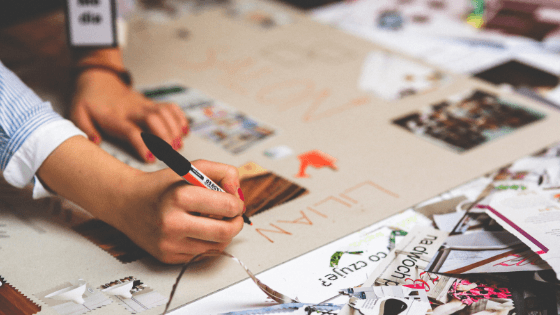Whatever Happened to Our Imagination?
Creativity is a soft-skill that is now demanded of us. When it drives innovation, today’s workforce is continuously pushed to be more creative, more innovative and strive to problem-solve big business issues.
Without really knowing it, we’ve made creativity into such a big deal it overwhelms us.
This is why many of us struggle to be creative because it’s expected to be something that we can just turn on like a tap. But as we all know, it doesn’t work like that.

If you ever watch a child play, their minds seem to run at a million miles an hour, consistently looking for the next stimuli and creating new games from the most basic items. I’m sure you’ve probably all heard parents complain that they may as well have bought their children a cardboard box than new toys. Well, this is the creative psychology that we all have deep inside of us.

When children play with a box, or wrapping paper, or those leftover washing-up bottles, they’re exploring who they are both through sensory and physical elements. This not only helps them to learn quickly about these objects but also enables them to develop a deeper understanding of self.
How does this link to creativity you ask? – well, consider this. Discovery leads to ideas. The more we know about something from a fresh perspective, the more we can push its limits and move beyond it.
Lack of Discovery
As adults, we go through far less episodes of discovery than children. And much of this hinders our progress in being able to adapt to change and build new ideas.
We either have a preconceived idea of how something should be, due to experience; or our ego rules in making us feel as though the capacity of our minds is already filled, and we don’t need to learn anymore.
Whether it’s one, or both combined. Our lack of discovery hinders us greatly and leaves our imagination as something that we see as childish.

Responsibility
The weight of responsibility curves us to follow a routine that ensures all the important parts of existing are dealt with. But this leaves little time for relaxation or play, key factors in helping us to establish a more creative lifestyle.
There’s an attitude of – “ I haven’t got time for that.” And this is rife both in the workplace and the home. We push aside what we deem as unimportant habits, in favour of chores or tasks.
Believing this is the way to live is detrimental to our imaginations. We no longer allow it to roam free, we control it and don’t let our minds go to the escape that it needs to be able to tap into all that creativity we have.
Fear & Realism
Think about some of the wildest ideas you came up with when you were a child. Can you remember them?
How did they make you feel, and did they put a smile on your face?
Hold those thoughts and feelings for a moment. That’s your imagination giving you a taste of what is still in your head.
As adults, we fear our imaginations because it doesn’t relate realistically to what we know is real in the world. So, we act like it’s silly, inconsequential, and as if it doesn’t matter anymore.
But we couldn’t be further from the truth. Our imaginations allow us to think beyond reality and build upon our experiences to generate new solutions and ideas that can genuinely change the way we live.
Just think about how a child reacts when they first experience something. There’s complete amazement and awe. The world is alien to a child, and each new experience brings with it an incredible amount of fascination.
It’s really sad, that we no longer see the world with such wide-eyed wonderment.

Imagination hasn’t run away from us completely, it’s that we simply hide it and focus our minds on all the reasons why we shouldn’t let it roam free.
We stop discovering new things, we replace it with responsible tasks, and we let fear control us.
The positive part is, we can bring our minds back to this place through a change of habits and a reset of the way we think. But we must be open to doing so.



